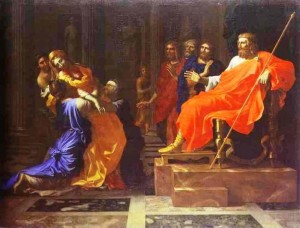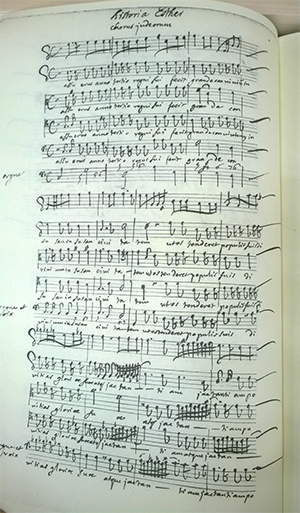Charpentier’s Historia Esther
 Perhaps because of its complications of plot, the role of narration (and consequently that of the historicus) is quite prominent in Esther. The narration is divided up between 4-part chorus, vocal trios, duos, and solos of every voice type and combination. To enliven the narration, the ensembles constantly shift musical texture between homophony and imitative polyphony. In between the narration of the historicus, soloists give voice to the main characters of the drama.
Perhaps because of its complications of plot, the role of narration (and consequently that of the historicus) is quite prominent in Esther. The narration is divided up between 4-part chorus, vocal trios, duos, and solos of every voice type and combination. To enliven the narration, the ensembles constantly shift musical texture between homophony and imitative polyphony. In between the narration of the historicus, soloists give voice to the main characters of the drama.
Esther relates the story of a Jewish girl who becomes queen of Persia and thwarts a genocide of her people. The biblical Book of Esther is set in the third year of the reign of Ahasuerus, a king of Persia. In the opening chorus, the Jewish people relate how Ahasuerus, ruler of a massive Persian empire, held a lavish party, initially for his court and dignitaries and afterwards for all the inhabitants of the capital city Shushan. Queen Vashti held a separate feast for the women of the palace. On the seventh day, Ahasuerus, merrier than usual with wine, commands Queen Vashti to display her considerable beauty before the guests but Vashti refuses to obey Ahasuerus’s order. Ahasuerus becomes very angry and consults his wise men as to a fitting punishment for his queen. One of them warns the king that other women in the provinces will learn from this and come to disobey their own husbands, and he advises Ahasuerus to remove Vashti as queen and give her estate to a more worthy consort.
Ahasuerus has a royal decree sent across the empire that men should be the ruler of their households and should speak their own native tongue. Ahasuerus then orders all the beautiful young girls in the empire to be presented to him, so he might choose a new queen to replace Vashti. One of these is the orphan Esther, who finds favor in the king’s eyes and is made his new queen. Esther at first does not reveal her Jewish background, as her uncle Mordecai had advised her.
Ahasuerus had appointed Haman as his prime minister; but Mordecai, who sits at the palace gates, fell into Haman’s disfavor when he refused to bow down to him. Three officers question Mordecai: “Why do you not obey the King’s commandments like the others and revere Haman?” Having found out that Mordecai is Jewish, Haman plans to kill not just Mordecai but all the Jews in the empire. Haman obtains Ahasuerus’s permission to execute this plan, against payment of ten thousand talents of silver; the King declines to accept payment and rather allows him to execute his plan on principle and he casts lots to choose the date on which to do this—the thirteenth of the month of Adar. On that day, everyone in the empire is free to massacre the Jews and loot their property.
The Chorus Judeorum now recounts that when Mordecai found out about the plans he rent his clothes and Jews in every province began to mourn and wail. Esther was afraid to plead for her people, for going to the King unsummoned was forbidden and would incur the death penalty. In a solo air a messenger tells Esther that she must go and trust in God; in any case she would not escape just because she is in the King’s house…and besides, saving her people is perhaps her destiny.
 Meanwhile, Mordecai was waiting at the palace gates when he happened to overhear a plot by two guards to assassinate King Ahasuerus. He told Esther, who told the king, and the two conspirators are apprehended and hanged—and Mordecai’s service to the king is recorded.
Meanwhile, Mordecai was waiting at the palace gates when he happened to overhear a plot by two guards to assassinate King Ahasuerus. He told Esther, who told the king, and the two conspirators are apprehended and hanged—and Mordecai’s service to the king is recorded.
On the third day, after Esther has wept and prayed, she appeared before the King unbidden, and the angered king had fury blazing in his eyes. A sudden change to ‘white notation’ occurs at this point in the score, as the choral historicus relates how Esther turned pale. At this point, God turned Ahasuerus’s arrogance to kindness and, fearing for Esther, he leaps from his seat and, holding Esther in his arms, speaks to her lovingly. In a beautiful solo air, Ahasuerus tells her that the decree was not made for her, but for others, and she shall not die; and Ahasuerus asks her what she wishes and tells her that he would grant her half his kingdom. Esther asks that Haman be brought to a second banquet that she has arranged. Ahasuerus orders that Haman come according to the queen’s request. At this news, Haman leaves the palace joyfully, but grows indignant when Mordecai refuses to rise to honor him. In a solo air, Haman express his displeasure with Mordecai and the Three officers relate how Haman ordered a gallows built for Mordecai.
Ahasuerus suffers from insomnia that night and requests the court recorders read to him to help him sleep. There he learns of the services rendered by Mordecai in the plot against his life. When he asks the three officers what reward Mordecai has received, he learns that Mordecai has not received any recognition for saving the king’s life. Just then, Haman appears to request that Mordecai be hanged. But Ahasuerus asks Haman what should be done for the man that the king wishes to honor. Thinking that the man that the king is referring to is himself, Haman says in a pretentiously noble aria that the man should be dressed in the king’s royal robes and led around on the king’s royal horse, while a herald calls: “See how the king honors a man he wishes to reward!” To Haman’s horror and surprise, the king commands Haman to do precisely this for Mordecai. After leading Mordecai’s parade, Haman returns in mourning to his wife and friends, and is then was summoned to Esther’s banquet.
Immediately after, Ahasuerus and Haman attend Esther’s second banquet. In a solo air Ahasuerus offers Esther whatever she would like and she responds that she would have her life spared (“ani-mam meam” is broken by a rest – a realistic touch suggesting a catch in her voice) and that of her people. In recitative Esther reveals to the king that she is Jewish and that Haman is planning to exterminate her and her people. Overcome by rage, Ahasuerus orders Haman to be hanged on the gallows that Haman had prepared for Mordecai. Esther sings a joyous air of jubilation accompanied by two violins and is joined in celebration by the Chorus Judaeorum, for this day of grief and sadness has changed into one of joy and gladness.